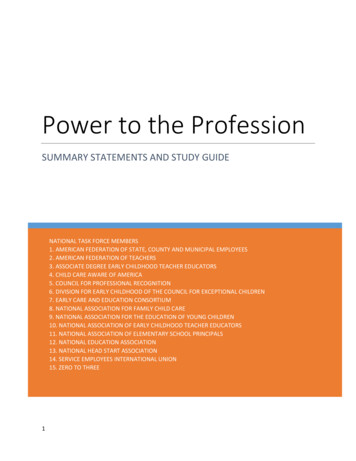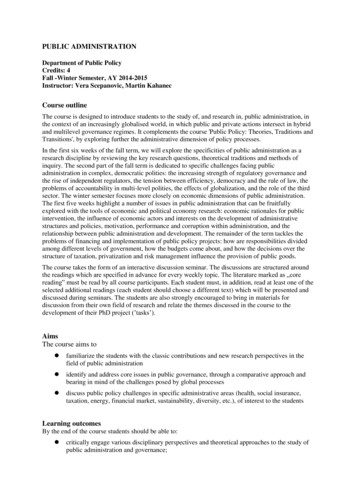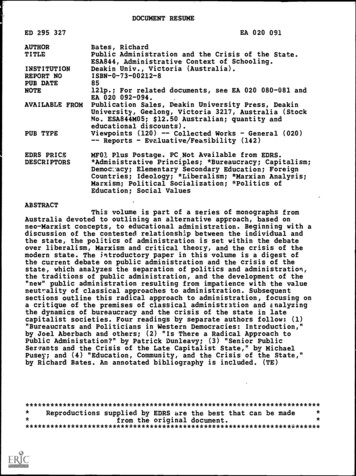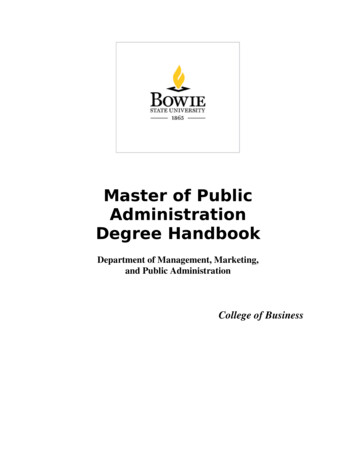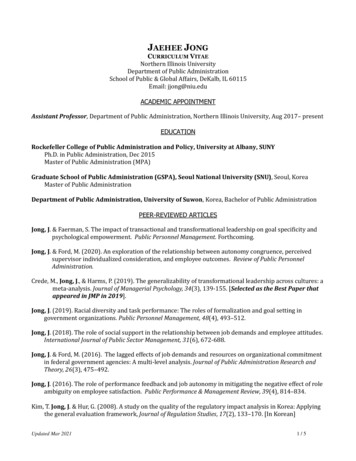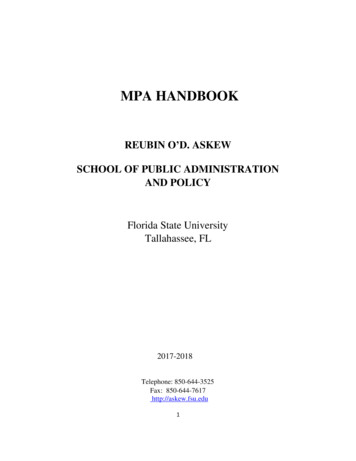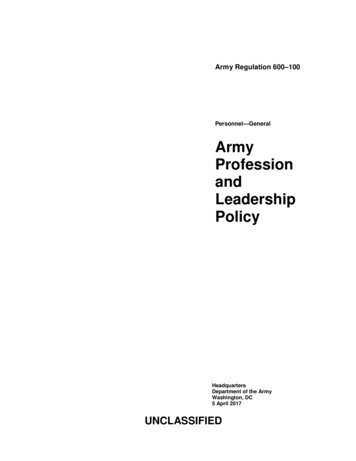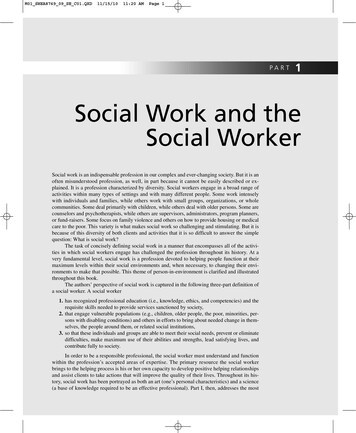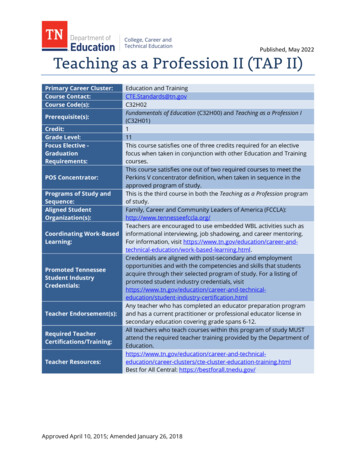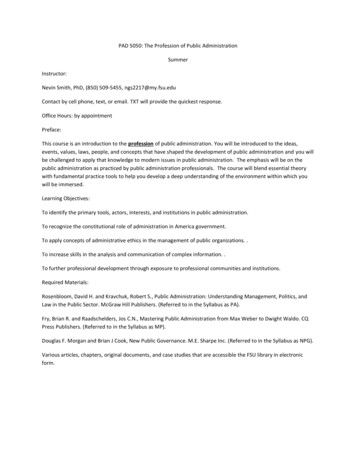
Transcription
PAD 5050: The Profession of Public AdministrationSummerInstructor:Nevin Smith, PhD, (850) 509-5455, ngs2217@my.fsu.eduContact by cell phone, text, or email. TXT will provide the quickest response.Office Hours: by appointmentPreface:This course is an introduction to the profession of public administration. You will be introduced to the ideas,events, values, laws, people, and concepts that have shaped the development of public administration and you willbe challenged to apply that knowledge to modern issues in public administration. The emphasis will be on thepublic administration as practiced by public administration professionals. The course will blend essential theorywith fundamental practice tools to help you develop a deep understanding of the environment within which youwill be immersed.Learning Objectives:To identify the primary tools, actors, interests, and institutions in public administration.To recognize the constitutional role of administration in America government.To apply concepts of administrative ethics in the management of public organizations. .To increase skills in the analysis and communication of complex information. .To further professional development through exposure to professional communities and institutions.Required Materials:Rosenbloom, David H. and Kravchuk, Robert S., Public Administration: Understanding Management, Politics, andLaw in the Public Sector. McGraw Hill Publishers. (Referred to in the Syllabus as PA).Fry, Brian R. and Raadschelders, Jos C.N., Mastering Public Administration from Max Weber to Dwight Waldo. CQPress Publishers. (Referred to in the Syllabus as MP).Douglas F. Morgan and Brian J Cook, New Public Governance. M.E. Sharpe Inc. (Referred to in the Syllabus as NPG).Various articles, chapters, original documents, and case studies that are accessible the FSU library in electronicform.
How will you be evaluated for a grade?Class Participation (10% of total grade)Full credit includes punctual and regular attendance; insightful participation in class discussions; fully prepared forclass. You may use your laptop or IPAD for taking notes or simultaneously looking up material in the class.A note about in class activity: Students that text, surf the net, email and play computer games during class areobvious to the instructor and if you conduct yourself in that way during class you will fail the class participationgrade. (Note: There are occasions that a student must take a text or call related to work, to monitor baby sitters orchildren, or a personal emergency. Other students may be sharing rides and must text near the end of class to letothers know they are almost finished. These are necessary and permissible. If this is the case please advise mebefore class so that I am aware and if it is also necessary please excuse yourself from the class to finish yourconversation if it is extensive and then return if possible.)As part of your class participation responsibility, starting in week two, and for most weeks that follow as noted inthe syllabus, you will turn in a printed written response to the weekly question listed in the syllabus at thebeginning of each class. Several paragraphs or more are sufficient. Your response may be displayed on theoverhead and used by the instructor as part of the class discussion and you may be asked to elaborate during class.Your writing style for this paper may be informal. It is the ideas and content that are important. This activitymakes up a significant part of your class participation grade.Askew Paper (15% of total grade) See syllabus Class Nine for description.Professional Analysis of Public Issues (30 % of total grade)You will write two short and very concise (approximately 4 pages in body New Times Roman 12 point type doublespaced one inch margins) papers in order to demonstrate your ability to apply course concepts and to performanalytical tasks. Instructions for each report will be discussed in class. You will use APA, MLA or another stylemanual. They will be graded as follows:Use of Course Materials and Concepts in the Development of the Paper (1-6 Points)Logic of Inquiry, Discussion and Analysis (1-6 Points)Editorial Content, length and Professional Writing (1-3 Points)Paper 1: From the reading in the text sections and outside readings, if you wish, explain from the work of MaryParker Follett regarding how conflict should be resolved within public organizations. Answer the followingquestions in your paper: 1. Follett does not think compromise the best way to resolve conflict. Why not? Also,how does that equate specifically with Democratic values (identify democratic values) and the creation of publicpolicy in a diverse society? 2. Follett can be discussed in concert with the arguments made for New PublicGovernance as discussed in your text. Explain how Follett’s ideas regarding the resolution of conflict support orrefute the new public governance perspective? Does she believe NPG requires use of the methods she supports aby public administrators to return to a focus of government effectiveness as the primary goal of governmentprograms in a diverse society or does she suggest a change in the NPG approach instead? Use the MP Chapter onFollett. The paper should flow as an overall discussion and the answers should be embedded in the text.
Paper 2: From the material referenced in the syllabus by Aaron Wildasky, prepare a paper using Widlasky’saxioms and rules that offers an understanding of which legislation Wildasky would see as best for addressing UShealth care issues (the Affordable Care Act or the legislation passed by the US House of Representatives.Career Development Report (10 % of final grade) NOTE: it requires an interview be careful regarding timing.You will also write an individual recommended course of development for a public service professional foryourself. There are, of course, many different types of careers in public service. Your document should be specificto your proposed career paths. There are a lot of possible format approaches to this report. However, you mustinclude all of the following items as a minimum: (1) recommended reading lists to maintain current professionalunderstanding: magazines/journals, blogs, commentaries, newspaper clipping services, and other informationsources and the purpose for reading each; (2) identification of the benefit of joining specific professionalassociations; obtaining certifications and credentials; attending professional conferences, and similaropportunities, and the focus of each item identified. (3) The third part of your report will be based on an interviewyou conduct with a public employee or official. It will be a summary of questions and answers in question andanswer format of at least two pages single spaced of the interview. It will be graded as follows:Quality and Comprehensive Nature of the Reading List (1-5 Points)Quality and Comprehensive Nature of the Certification and Credential List (1 to 5 Points0Professional Quality of the Interview (1 to 5 Points)A Test (35 % of Course Grade)The test will be taken home and turned in one week later. It is in essence a series of very short essays to questionsimposed by the instructor. Students should stay current in the readings, attend the classes and be aware of theclass notes provided in power point. The test will require students to integrate the weekly topics to demonstrategraduate-level knowledge of the profession of public administration. This requires more than just parroting backwhat is included in the material. Answers will require the ability to synthesize the material and apply it. Studentswill do well if they maintain the reading schedule and actively participate in class as to the meaning of thematerial. It will contain multiple questions. Because you will have the ability to consult the course material forthe test the standard against which the answers will judged will be high. Each answer will be assigned pointsbased on completeness of response, the depth of understanding of the material, the logic of analysis associatedwith the answer, and the quality of the written answer.Course Grading Scale:A 93-100%B 87-89.99% C 77-79.99% D 67-69.99%A- 90-92.99%B 83-86.99%C 73-76.99%D 63-66.99%B- 80-82.99%C- 70-72.99%F 63.99%
Course Schedule:Class One: May 17Lecture, An introduction to Public Administration and PAD 5050Class Two: May 24 Conducted ON LINE. Do not report to class. A look at public administration ethicsthrough different lens.We will conduct class ONLINE as a discussion board forum. WE will NOT meet in class. I have openeda discussion board for you. Use the readings identified below then,Between May 17 and 6PM Wednesday May 24 Post your answer to the following: Identify three ethicalstandards that should be followed by public administrators and explain why they are important.By 6 PM all class members will have posted their answers.By 8:30 post responses to TWO (2) class member answers. Each of your two responses should besubstantive and at least one paragraph long. Resist posting things like "good job, I agree".certainlyyou can agree but if you do please support their post don't judge it. IF a class member has receivedmore than four responses to their answer please pick other class members for your response ifpossible. I would prefer that all class member receive at least one response, if possible so keep thatin mind when you make your choices.You MAY if you wish respond to those that post responses to your answer or you can let their responsestand unanswered.We are doing this for two reasons. 1. I try to conduct an on line communication exercise in eachclass because of the frequency with which it occurs in the real world. Most students are appreciativeof the opportunity. 2. In this case, I have picked this particular class because it lends itself to theexercise and because my middle stepson high school graduation is at this time.Read:Searching for Virtue in the Public Life: Revisiting the Vulgar Ethics Thesis. H. George Frederickson in Public IntegrityJuly 2010. Available through FSU Library Academic Search Complete Database or other.Big Questions in Administrative Ethics: A Need for Focused, Collaborative Effort, Terry L. Cooper, PublicAdministration ReviewVol. 64, No. 4 (Jul. - Aug., 2004), pp. 395-407Difficulties ? Text me at 850 509 5455Class Three: May 31Institutions are a part of the foundation of public administration but what is an institution in this context?Read in order listed:1. Institutions: Walter C. Neal. Journal of Economic Issues. Vol21, No. 3, Evolutionary Economics:Foundations of Institutional Thought (Sep., 1987.
2.Institutions as Incentives for Civic Action: Bureaucratic Structures, Civil Society, and Disruptive ProtestsAgnes Cornell Aarhus University Marcia Grimes University of Gothenburg3.NPG Chapter Three Institutional History and New Public Governance4.PA Chapter 11 Public Administration and Democratic ConstitutionalismWeekly Summary QuestionHow do values get embedded in institutions in the public Sector in ways that allow them to persist over time?Class Four: June 7 A starting point from which to understand.Read :MP Preface and IntroductionPA Chapter 1 The Practice and Discipline of Public AdministrationWeekly Summary Question:Select among the mixture of 7 characteristics and 4 perspectives (21 choices) the most important combination of 3to build a solid foundation for professional public administration and briefly explain your selection.Career development report due. Selected students will provide the class an explanation of their careerdevelopment ideas.Class Five: June 14 The Administration in Public AdministrationRead:PA Chapter 2 The American Administrative StateMP Max Weber.ArticleWho Governs the American Administrative State? A Bureaucratic-Centered Image of Governance. Hill. S Journal ofPublic Administration Research and Theory. 1991.NPG Brian Cook Regime Leadership for Public ServantsWeekly Summary: Combine the four readings into a single brief response to the question: in what way has theconflict between the bureaucratic and the elected classes emerged as one dominate theme of society in theUnited States in the 21st century?Class Six June 21 Who will you be?
Chapter 4 OrganizationNP Chapter 17 Agency in Networks by Eric MogrenProfessor Fran Barry in her syllabus for PAD 5035 class writes: “While a public employee is obligated to play certainroles, to some degree, you will also decide what roles you think appropriate and are willing to play as an analyst,lobbyist, or manager in the public policy process. Your decisions may vary depending on your view of the role ofthe public servant in democratic society, your personality, and your view on the flexibility or discretion inherent infollowing the law as written down.”Weekly Summary Question: What is the proper role of the public sector bureaucrat in a networked society?Class Seven: June 28 Human ResourcesPAPER ONE DUERead:Find and read an article on the history of the merit system in federal, state and local governmentMP Chapter Five Elton MayoPA Chapter 5 Public Personnel AdministrationQuestion:Does Human Resources in the public sector add value to organization performance?Class Eight: July 5 Reuben Askew and how to be a truly outstanding public servant.Research, read and write a two-three page paper for the purpose of a class discussion. (New Times Roman 12point type single spaced) You will turn in the paper at the beginning of class. You will present your paper insummary form of approximately 5 minutes. This activity will be factored into your overall class participation gradeand will count for 25% of your class participation grade. Some of the papers posted may be selected for inclusionin the test material. The subject follows: Reuben Askew as Governor of Florida fought for open government in aconstitutional amendment and in other ways. Based on your research list three elements Governor Askew thoughtof as important in open government and explain why each was important as it related to governmentalperformance and the institutions of democracy. Compare those three elements to newspaper accounts betweenthe years of 1979 and 2009 of state and local government individuals and programs in Florida that appeared,according to the press, to violate each of the elements you found. Provide a summary or summaries from the timeperiod covered of an example(s) that violated each one of the three elements you identified. You may use morethan one example, if necessary, to cover each of the elements. Be sure to include citations. You may find LexisNexis helpful.A point of beginning for your effort follows: On July 29, 2013 the Tampa Bay Times writes “It was in that roomwhere Askew, as a young senator in the late 1960s, helped force rural "pork chop" senators to redistribute politicalpower based on the principle of one man one vote, even though "Rube" himself came from prime pork chopterritory: Pensacola."I don't think they ever forgave me," Askew said.
Askew is considered one of Florida's greatest governors. The Kennedy School of Government at Harvard Universityrated him one of the 10 best in the United States in the 20th century.He was elected in 1970 on a risky populist platform that included taxing profits of corporations the wayneighboring Georgia did He stressed racial diversity and peaceful desegregation of schools, modernized an antiquated judiciary and in 1978,during his last year in office, stopped casino gambling.When a recalcitrant Legislature refused to pass ethics reform after a series of scandals, he took his case straight tothe people and voters wrote the "Sunshine Amendment" into the Constitution, with financial disclosurerequirements and limits on post-employment lobbying by elected officials.”Class Nine: July 12 PUBLIC Policy . it happens a lot.Read: MA Chapter 8 LindblomPA Chapter 8 Policy AnalysisChapter 7 Herbert SimonNP: Chapter 6 Two Kinds of Rationality and Their Implications for New Puplic Governance by Michael SpicerResearch the public policy term “garbage can theory” and read at least one article.Weekly Summary Question: If you have to be the public policy maker, how will you do it?Class Ten: July 19 Note: The readings below are the basis for the Second PaperIt is due this week along with a presentation you will make to the class.Test Handed OutRead the complete article from which the following is an excerpt.Aaron Wildavsky, in the article Doing Better and Feeling Worse: The Political Pathology of Health Policy, Daedalus,Vol. 106, published in 1977 writes “Health policy is pathological because we are neurotic and insist on making ourgovernment psychotic. Our neurosis consists in knowing what is required for good health (Mother was right: Eat agood breakfast! Sleep eight hours a day! Don't drink! Don't smoke! Keep clean! And don't worry!) But not beingwilling to do it. .”He continues ” According to the great equation, Medical Care equals Health. But the Great Equation is wrong.More available medical care does not equal better health. The best estimates are that the medical system(doctors, drugs, hospitals) affects about 10 per cent of the usual indices for measuring health: whether you live atall (infant mortality), how well you live (days lost due to sickness), how long you live (adult mortality). Theremaining 90 per cent are determined by factors over which doctors have little or no control, from individual lifestyle (smoking, exercise, worry), to social conditions (income, eating habits, physiological inheritance), to thephysical environment (air and water quality). Most of the bad things that happen to people are at present beyondthe reach of medicine.
Everyone knows that doctors do help. They can mend broken bones, stop infections with drugs, and operatesuccessfully on swollen appendices. Inoculations, internal infections, and external repairs are other good reasonsfor keeping doctors, drugs, and hospitals around. More of the same, however, is counterproductive.Nobody needs unnecessary operations; and excessive use of drugs can create dependence or allergic reactions ormerely enrich the nation's urine.More money alone, then, cannot cure old complaints ”He asks: “Why should government pay billions for health and get back not even token tribute? If government isgoing to be accused of abusing the poor, neglecting the middle classes, and milking the rich; if it is to becondemned for bureaucratizing the patient and coercing the doctor, it can manage all that without spendingbillions.Slanders and calumnies are easier to bear when they are cost-free. Spending more for worse treatment is as bad apolicy for government as it would be for any of us. The only defendant without counsel is the government. Whatshould it do?The Axiom of Inequality cannot be changed; it is built into the nature of things. What government can do is tochoose the kinds of inequalities with which it is prepared to live. Increasing the waiting time of the rich, forinstance? That is, having them wait as long as everybody else? may not seem outrageous. Decreasing subsidies inNew York City and increasing them in Jacksonville may seem a reasonable price to pay for national uniformity.From the standpoint of government, however, the political problem is not to achieve equal treatment but to getsupport, at least from those it intends to benefit. Government needs gratitude, not ingrates.The Principle of Goal Displacement, through the double-displacement effect, succeeds only in substituting accessto care for health; it by no means guarantees that people will value the access they get. Equal access to care willnot necessarily be equated with the best care available or with all that patients believe they require.Government's task is to resolve the Paradox of Time so that, as things get better, people will see themselves asbetter off ”He concludes, “Health policy is pathological because we are neurotic and insist on making our governmentpsychotic. Our neurosis consists in knowing what is required for good health (Mother was right: Eat a goodbreakfast! Sleep eight hours a day! Don't drink! Don't smoke! Keep clean! And don't worry!) but not being willingto do it. Psychosis appears when government persists in repeating this self-defeating play. Maybe twenty-firstcentury man will come to cherish his absurdities.”Class Eleven: July 26 BudgetingNPG Chapter 4 A value Based global Framework for New Public Governance by Morgan, Larsen, Bao and WangAccounting for Changes in the U.S. Budget Deficit By Troy Davig and Michael RedmondTrust Matters: Enhancing Government Legitimacy through Participatory Budgeting Rachel SwanerAugust 2 Class Twelve Turn in Test and Discussion Summary of the TermOther important Information
It is possible that during the term I may be required to attend a meeting out oftown on one night that we have class because of my employment with FDLE. IFthat occurs we will take the class on line. I will notify you. I will post the classdiscussion information on blackboard and you will write a thoughtful and detailedresponse to the reading material for the week. You will read each person’s postand make a comment to their post. You will also read the posts you rreceiveregarding your own original post. If this is necessary we will discuss it in furtherdetail.Text me regarding absence planned a week in advance or not planned as soon as possible. Excused absencesinclude employment related requirements including conferences, documented illnesses, deaths in the immediatefamily and other documented crises, call to active military or jury duty, religious holy days, and official Universityactivities. Accommodations for these excused absences will be made and will do so in a way that does not penalizestudents who have a valid excuse. Consideration will also be given to students whose dependent childrenexperience serious illness.Americans with Disabilities ActStudents with disabilities needing academic accommodation should: ( 1) register with and provide documentationto the Student Disability Resource Center; and (2) bring a letter to the instructor indicating the need foraccommodation and what type. This should be done during the first week of class.This syllabus and other class materials are available in alternative format upon request. For more informationabout services available to FSU students with disabilities, contact the Student Disability Resource Center, 874Traditions Way, 108 Student Services Building, Florida State University, Tallahassee, FL 32306-4167Academic Honor Policy The Florida State University Academic Honor Policy outlines the University’s expectationsfor the integrity of students’ academic work, the procedures for resolving alleged violations of those expectations,and the rights and responsibilities of students and faculty members throughout the process. Students areresponsible for reading the Academic Honor Policy and for living up to their pledge to be honest and truthful and . . [to] strive for personal and institutional integrity at Florida State University. (Florida State University AcademicHonor Policy, found at http://dof.fsu.edu/honorpolicy.htm.)Late WorkLate assignments and reports will not be accepted unless advanced arrangements are made at the sole discretionof the instructor.Syllabus ChangesThis syllabus may change as we go through the course if I believe it is necessary to enhance your learning. Theindividual graded assignments will not change. I will provide advanced notice of any changes by email to yourregistered course email address or by announcement on Blackboard.
PAD 5050: The Profession of Public Administration Summer Instructor: Nevin Smith, PhD, (850) 509-5455, ngs2217@my.fsu.edu Contact by cell phone, text, or email. TXT will provide the quickest response. Office Hours: by appointment Preface: This course is an introduction to the profession of public administration. You will be introduced to the ideas,
